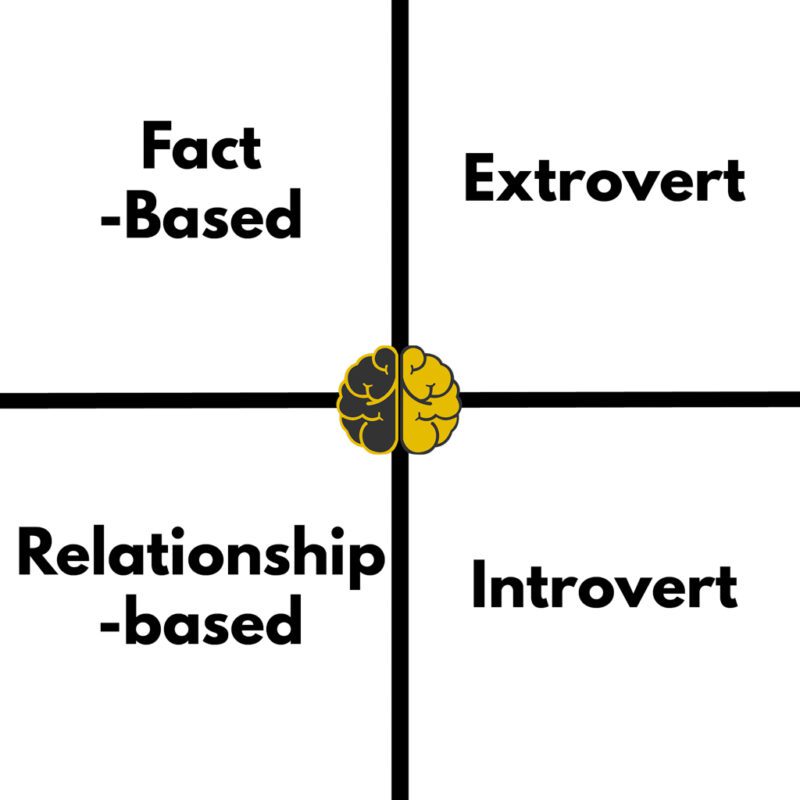According to gym owner and mentor Brian Bott, four personalities can be found in your gym.
To recap, the characteristics on the left combine with those on the right to create four groups:

You can divide clients among these four personality groups, as well as staff members. To get the most out of your team, here’s how to manage each type of person.
The Fact-Based Introvert
Use spreadsheets and data. Career Roadmap sessions work exceptionally well if you give these people very specific targets. Your mission and vision matter less than “we need to do 15 goal reviews per month.”
Fact-based introverts want to be told exactly what to do and why. They’re not going to do well making choices on their own because they tend to over-analyze and become paralyzed. You will need to give them deadlines and explain what “done” looks like.
These people might be amazing at program design but not the greatest coaches.
In a management role, they’re good at reporting problems but not good at solving problems on their own. The issue: They’re still perfectionists. Establish bare minimums and teach them when a B+ is acceptable. You’ll have to coach them on the difference between being “right” and being “effective.” Luckily, these people will respond very well to specific feedback and coaching.
One warning: Their constant attention to rules and details might show up as condescension or sarcasm. Let them know how they appear to others on the team. Ask for their opinion to make them feel smart.
The Fact-Based Extrovert
The strong personalities—they want to be in control and take the lead.
Give them projects that they can “own” and let them run with them. The intrapreneurial model works especially well here: Give them a specialty group, break down the exact steps for them to take, and they will get the work done and run a great program.
However, fact-based extroverts might be loud in meetings, talk over others or step on toes to get their jobs done.
These members of your team might prefer more direct feedback, but you still have to focus on what they’ve done right first. Being argumentative will escalate. Ask “how do you think you did?” and “if we did this again, what could we do better?”
As Brian says, “It’s all sales. You’re still selling them on correcting their course.”
Fact-based extroverts respond well to big-picture thinking, like seeing your vision board or mission statement.
Their eagerness means they are good at starting projects but might need help with the steps. They’ll stay motivated as long as they see progress.
The Relationship Introvert
These people are calm, laid back and not easy to excite.
You want to give all praise and criticism to relationship introverts in private. Don’t correct them in front of others. They want to fit in. You can even write them a letter or send them a voice message to praise them or ask them questions. They wouldn’t want to be interviewed for an Instagram reel.
Their fear is disappointing you. You need to explain the need for expediency and why delivering quickly at a B+ level is better than not getting anything done.
End-of-shift notes are really effective with these staff members. They’ll be nervous about having a meeting or formal evaluation.
The Relationship Extrovert
People in this group are very enthusiastic but most likely to overextend themselves. They’ll never want to say “no” because they want to help, but they might not know their own limitations. They need to be told it’s better to say “no” than to overpromise and underdeliver.
Make sure you’re taking advantage of their energy and enthusiasm, but give them guidelines. Tell them why it’s important to stick to the rules. For example, these coaches might think they’re “overdelivering” by letting their sessions run over time. But really, they’re negatively impacting the business because being behind has a snowball effect on the next classes and clients.
A coach who’s a relationship extrovert might also want to know why they can’t just stick around after class and give people one-on-one coaching for free. Explain with reference to fairness. Lay out the consequences of “free personal training” for the business and explain how the rules apply to everyone else.
Learn to Lead
Your staff members want to do their best work. To help them, you need to lead each person slightly differently.
This isn’t easy—especially if a team member’s personality is very different from yours. But true leadership of diverse groups requires a CEO to develop and constantly improve skills. If you want to be a great CEO and grow your gym business, analyze your staff and tailor your approach to each person.
Other Media in This Series
“Sales Secrets: The Four Personalities in Your Gym”
“The Four Personalities: Tailored Coaching and Programming”

